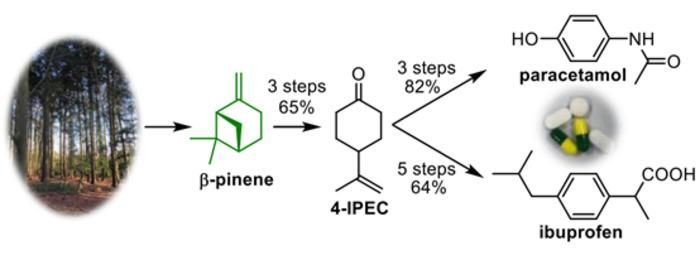Scientists make common pain killers from pine trees instead of crude oil
New method converts one of the components of turpentine into a range of valuable chemical starting blocks for perfumes, plastics and drugs such as ibuprofen
A team of scientists, from the University of Bath’s Department of Chemistry and Institute for Sustainability have found a way to create two of the world’s most common painkillers, paracetamol and ibuprofen, out of a compound found in pine trees, which is also a waste product from the paper industry.

Conversion of β-pinene into paracetamol and ibuprofen
University of Bath
It is perhaps not widely known that many common pharmaceuticals are manufactured using chemical precursors derived from crude oil, presenting a niche sustainability challenge as the world targets Net Zero.
The research team from Bath has developed a method of creating a range of pharmaceutical precursors from biorenewable β-pinene, a component of turpentine which is a waste by-product from the paper industry (annual production >350,000 tonnes).
They successfully converted β-pinene into two everyday painkillers, paracetamol and ibuprofen, which are produced on ~100,000 tonne scales annually.
They also successfully synthesised a range of other precursor chemicals from turpentine, including 4-HAP (4-hydroxyacetophenone), which is the precursor of drugs including beta-blockers and the asthma inhaler drug, salbutamol, as well as others widely used for perfumes and in cleaning products.
They hope that this more sustainable “biorefinery” approach could replace the need for crude oil products in the chemical industry.
Dr Josh Tibbetts, Research Associate in the University’s Department of Chemistry, said: “Using oil to make pharmaceuticals is unsustainable – not only is it contributing to rising CO2 emissions, but the price fluctuates dramatically as we are greatly dependent on the geopolitical stability of countries with large oil-reserves, and it is only going to get more expensive.
“Instead of extracting more oil from the ground, we want to replace this in the future with a ‘bio-refinery’ model.
“Our turpentine-based biorefinery model uses waste chemical by-products from the paper industry to produce a spectrum of valuable, sustainable chemicals that can be used in a wide range of applications from perfumes to paracetamol.”
Instead of putting chemicals in a large reactor to create separate batches of product, the method uses continuous flow reactors, meaning production can be uninterrupted and easier to scale up.
Whilst the process in its current form may be more expensive than using oil-based feedstocks, consumers may be prepared to pay a slightly higher price for more sustainable pharmaceuticals that are completely plant-derived.
Original publication
Most read news
Other news from the department science

Get the chemical industry in your inbox
By submitting this form you agree that LUMITOS AG will send you the newsletter(s) selected above by email. Your data will not be passed on to third parties. Your data will be stored and processed in accordance with our data protection regulations. LUMITOS may contact you by email for the purpose of advertising or market and opinion surveys. You can revoke your consent at any time without giving reasons to LUMITOS AG, Ernst-Augustin-Str. 2, 12489 Berlin, Germany or by e-mail at revoke@lumitos.com with effect for the future. In addition, each email contains a link to unsubscribe from the corresponding newsletter.




























































